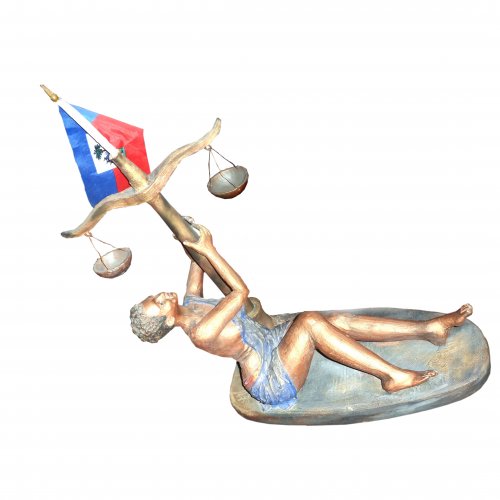Best Employment Benefits & Executive Compensation Lawyers in Haiti
Share your needs with us, get contacted by law firms.
Free. Takes 2 min.
Or refine your search by selecting a city:
List of the best lawyers in Haiti
About Employment Benefits & Executive Compensation Law in Haiti
Employment benefits and executive compensation in Haiti are governed by a combination of labor laws and other regulations. These laws mandate minimum standards that employers must adhere to concerning employee compensation packages and benefits. This legal framework is essential for ensuring fair treatment of workers and proper remuneration for executives. Key components typically include salary, health benefits, retirement plans, bonuses, and other forms of compensation that might be negotiated between an employer and an employee or executive.
Why You May Need a Lawyer
There are several scenarios where one might require legal advice related to employment benefits and executive compensation in Haiti:
- Disputes Over Compensation Packages: Whether it's a case of promised benefits not being delivered or disagreements over bonus structures, a lawyer can help resolve these issues.
- Contract Negotiations: For executives or employees negotiating compensation packages, legal advice ensures terms are fair and agreements are clear and binding.
- Regulatory Compliance: Employers may seek legal guidance to ensure their compensation packages comply with Haitian labor laws and regulations.
- Discrimination and Unequal Pay: Legal assistance may be necessary if there is evidence of discrimination or unequal pay practices.
- Healthcare and Retirement Benefits: Navigating the legalities of health or retirement benefits can be complex, and a lawyer can provide clarity.
Local Laws Overview
Haitian labor laws provide key guidelines for employment benefits and executive compensation. Some pertinent aspects include:
- Minimum Wage: Legally defined minimum salaries must be adhered to, helping to prevent exploitation of workers.
- Labor Code: The Labor Code of Haiti outlines the employment conditions, including guidelines on wages, holidays, leave, and other benefits.
- Deductions and Contributions: Employers are required to manage taxes and other withholdings properly, impacting how compensation is structured and delivered.
Frequently Asked Questions
What types of employment benefits are typically offered in Haiti?
Typical benefits include health insurance, meal allowances, transportation allowances, and retirement savings plans.
Are bonuses commonly included in executive compensation in Haiti?
Yes, bonuses are often a part of executive compensation packages, typically linked to performance metrics.
Can an employment contract override the minimum wage laws in Haiti?
No, employment contracts must comply with the minimum wage laws, and any clause contravening these laws would be considered void.
How are disputes related to benefits and compensation resolved?
Disputes may be resolved through mediation, arbitration, or litigation in accordance with labor dispute regulations.
What protections exist for employees regarding discrimination in compensation?
Haitian laws prohibit discrimination based on gender, race, or other protected categories, and this extends to compensation practices.
Do part-time workers qualify for the same benefits as full-time employees?
The qualification for benefits can vary, often depending on the employer's policies and the specifics of the employment contract.
How are executive compensation packages structured in Haiti?
They typically include a base salary, performance bonuses, stock options, and other financial or non-financial perks.
What should be included in an employment contract regarding benefits?
Contracts should detail salary, bonuses, pensions, vacation, health insurance, and any other agreed-upon benefits.
Is it mandatory to have a written employment contract for benefits in Haiti?
While verbal contracts are legally binding, written contracts are strongly recommended for clarity and legal protection.
What is the process of negotiating benefits in an executive package?
This typically involves discussions between the candidate and the employer, often with legal advisors to ensure fairness and compliance.
Additional Resources
Consider reaching out to the following resources for more information and assistance:
- The Ministry of Social Affairs and Labor (MAST).
- Local labor unions and employee advocacy organizations.
- Business associations that can provide guidelines and support for employers.
Next Steps
If you need legal assistance in Employment Benefits & Executive Compensation in Haiti, consider the following steps:
- Consult with a Lawyer: Find a local attorney specializing in labor law to discuss your specific situation and needs.
- Gather Documentation: Be prepared with all relevant documents, including contracts, pay stubs, and any correspondence related to your inquiry.
- Understand Your Rights: Familiarize yourself with Haitian labor laws to better understand your rights and obligations.
- File a Complaint: If necessary, you may need to file a formal complaint with a relevant governmental body or pursue a legal claim.
Lawzana helps you find the best lawyers and law firms in Haiti through a curated and pre-screened list of qualified legal professionals. Our platform offers rankings and detailed profiles of attorneys and law firms, allowing you to compare based on practice areas, including Employment Benefits & Executive Compensation, experience, and client feedback.
Each profile includes a description of the firm's areas of practice, client reviews, team members and partners, year of establishment, spoken languages, office locations, contact information, social media presence, and any published articles or resources. Most firms on our platform speak English and are experienced in both local and international legal matters.
Get a quote from top-rated law firms in Haiti — quickly, securely, and without unnecessary hassle.
Disclaimer:
The information provided on this page is for general informational purposes only and does not constitute legal advice. While we strive to ensure the accuracy and relevance of the content, legal information may change over time, and interpretations of the law can vary. You should always consult with a qualified legal professional for advice specific to your situation.
We disclaim all liability for actions taken or not taken based on the content of this page. If you believe any information is incorrect or outdated, please contact us, and we will review and update it where appropriate.
Browse employment benefits & executive compensation law firms by city in Haiti
Refine your search by selecting a city.








